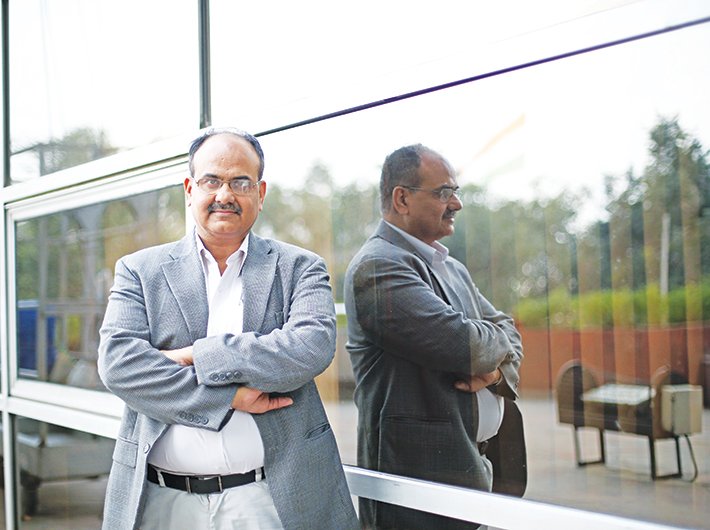On AadhaarPay
Today more than 112 crore people have the Aadhaar card. Approximately 40 crore people have linked their Aadhaar numbers to their bank accounts. We already have a system of Aadhaar authentication in place.
To promote cashless economy, we have to consider all different segments of people. We have people who are well educated; they can use all digital channels like smartphones, apps, internet, debit cards, credit cards, etc and make payments. But what about those people who don’t have access to smartphones, or say, a feature phone, those who cannot handle debit card PIN or password? There are 30 crore people like them and these people mostly belong to the disadvantaged sections of society. We want to bring them into the digital payment mainstream. If they have an Aadhaar number, and their bank accounts are linked to Aadhaar, then they can make payments through AadhaarPay. They don’t need a smartphone or feature phone. They don’t need a debit card. They just need to remember their bank name, Aadhaar number and when they make some purchase, they need to put the Aadhaar number, select the name of the bank, amount to be paid, and put their fingerprint on the merchant’s device; the money will be debited from the customer’s account and get credited to the merchant’s account.
As the finance minister has announced in the 2017 budget, 20 lakh Aadhaar-based PoS machines will be introduced to enable AadhaarPay by September 2017. This is the infrastructure that will be available in the country. This kind of infrastructure is not available anywhere else in the world. Banks will be encouraged to select 30-35 merchants in their vicinity to become Aadhaar Merchants. If every bank tries to work with local merchants and provides assistance, then 20 lakh is not an impossible task to achieve.
On mandatory Aadhaar
Section 7 of the Aadhaar Act says that if any service or subsidy is being given from the Consolidated Fund of India, the concerned person may be required to provide Aadhaar or go for Aadhaar based authentication. But the Act also says that if somebody doesn’t have Aadhaar, he will be required to make an application for it, and till the number is assigned, benefits will be given to him through alternative mechanism. If a resident needs assistance in applying for Aadhaar, the [concerned] department will have to provide it. The authorities who ask for Aadhaar will have to facilitate the enrolment process for such residents, according to the Act.
[As for enrolment,] Aadhaar saturation is poor in Jammu and Kashmir and the North-Eastern states. The work is going on, they will also come at par with other states. But it should not happen that just because Aadhaar enrolment facility is not available, the benefits will be denied to residents.
As such, Aadhaar is voluntary. But if you want to receive any [government] benefit or service then you may have to apply for an Aadhaar card.
On private firms and verification
It is not true that a parallel database is being created by private companies. The domain or a company has a specific database where they have details of their clients that will remain with the respective domain or company only to confirm the identity of the person through authentication.
Private industry can ask for the Aadhaar number, because the Aadhaar Act allows that private players can also use Aadhaar to authenticate their employee/customers.
On database security
Technologically, we are making all the arrangements [to ensure] that our database is safe and secure. We have been using the latest technology to ensure our database remains safe. Also, the Aadhaar Act has very strong security provisions. It says that any attempt to breach into Aadhaar security will be punished [with] three years of imprisonment. So, on the legal side, we have already placed the strong safeguards.
On investment
We make necessary investments to make sure that our technology infrastructure is up to date and our data remains secure. There is no budget limit. So far, total investment in the Aadhaar project in the last seven years is '8,000 crore. Fund is not a constraint. It is the government’s priority project.
On cost-effectiveness of authentication
Aadhaar authentication is cost-effective [in comparison], because, if you see other means of identification… you have to send a person to someone’s home to do the verification process. Again, in all the contemporary modes of verification, there could still be a lot of gaps. Compared to that, in Aadhaar, one just has to give his fingerprint. The whole e-KYC information comes in a secured manner.
Aadhaar authentication works through the 2G also. So we don’t see much problem on the connectivity side. Majority of the country is covered [by 2G]; not more than 10 percent of the total is short of connectivity.
On right to privacy
I don’t think that collecting biometrics poses any threat to the right to privacy because people have been giving their thumb impression for ages. The biometrics we collect are encrypted at source and kept safe and secure. Unauthorised sharing and leakage of the data does not happen. Fears related to collection of biometrics from citizens are not justified.
As and when we find that some suspicious activity or misuse is happening, we will strike at the very beginning [of misuse] itself. We have full authentication regulation under the Aadhaar Act that has to be followed. It specifies in what manner authorities can use Aadhaar.
On the verification process
What we get from the person is the biometrics and the Aadhaar number or the Aadhaar number and the name. We confirm the identity of the person by answering only in yes or no. We don’t give the biometrics. This information too is given only on the consent of the resident. We say that if your Aadhaar information is given for one purpose, it can neither be used for any other purpose nor be disclosed to anyone else. It has to be kept confidential. If we find that it has not been kept confidential, violators are liable to get punished under the Aadhaar Act.
Future
Aadhaar will help the whole country to go digital. It will empower people so that no one is left behind. It provides a digital identity and through it, all Indians can do transaction in a cashless, paperless and transparent manner.
(The interview appears in the March 1-15, 2017 issue of Governance Now)



